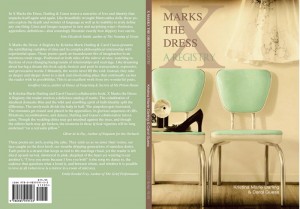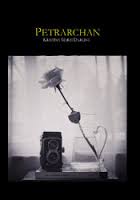78 pages, $14.00
Review by Carley Moore
Marriage, it turns out, is a kind of fortress. Or maybe marriage just calls us to homes—some of us will wind up in cabins, others apartments, and still others McMansions. Regardless of whether or not we can afford the down payment, the mortgage, or the rent, the ideology around marriage and housing runs deep in America. How else to explain why so many of us went belly up in 2008 so that we could have a chance at owning our little piece of the American dream? And why do we continue to get married when the divorce rate is well over thirty percent?
Kristina Marie Darling’s newest collection of poetry, Fortress, is a spare examination on the ruins of a marriage and the pain of that loss. The book’s shape calls to mind a box, square rather than the traditional rectangle, and aside from the preface and the epilogue which are erasures of Elaine Scarry’s classic work The Body in Pain—the poems inhabit the bottom of each page in the form of either footnotes or spare lines of prose. The remainder of the page is blank white space, a field onto which we can project our responses. The layout of these pages reminded me of the story templates my daughter’s first grade teacher gives her students; lines at the bottom and a vast white space for drawing. Part of this book’s beauty lies in Darling’s commitment to the white space, to the meadow, garden, and flowerboxes in which the speaker and her husband grow poppies, lilies, and geraniums. This landscape is contested, the meadow is burned, the poppies die, and the husband tears out primroses so that he can begin “tending the garden himself, with all of the grace of a landscape painter.” The book makes references to Persephone, romantic poets like Keats, and opium traffics in a dreamy-drug induced haze, and I couldn’t help but think of those early mythological marriages (Leda and Europa) in which the proposal is nothing more than a rape. The speaker seems just as baffled by her marriage, and she wanders the fortress of her house and its grounds picking up the objects from her trousseau as if on a hunt for clues as to who she was before she became a wife. In my favorite poem of the book, the speaker asks, “What is there left to say? When we married, I became his wife. I can no longer remember what I looked like before that veil descended, or the vow exchanged between us.” This poem, like many others in Darling’s book, suggests that the pain of a ruined marriage is a surprise and in some ways, like Scarry’s premise, beyond language. Continue reading
![[PANK]](https://pankmagazine.com/wp-content/themes/pank/assets/images/pank-logo-large.png)




